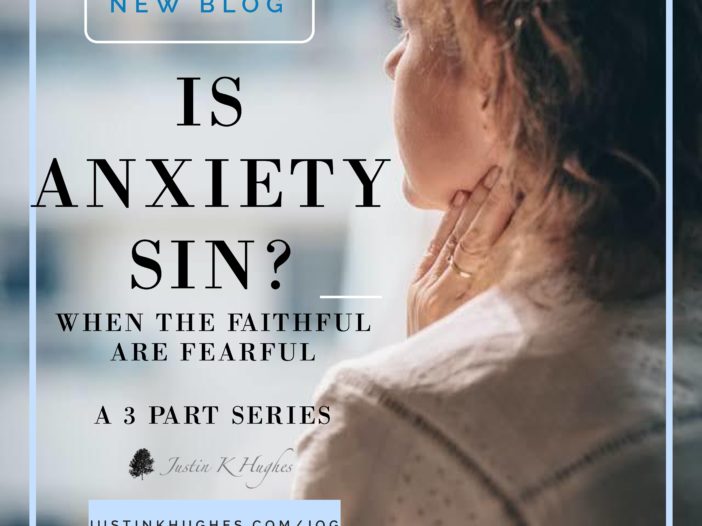
In the first part of this series, fear and anxiety was presented as a warning system that can operate properly or erroneously. We examined how saints throughout history (in the Bible, specifically) directly were fearful, afraid, or anxious, and this was not necessarily linked with sin. Let’s jump into why and how spending the time to address fear and anxiety properly can truly lead to more joy and confidence.
Why Addressing Fear Can Set You Free
An in-depth look at whether anxiety is a sin or not becomes all the more important for those who suffer deeply with it. In fact, in my experience, those who worry about the question are often concerned more because they are sensitive souls in the first place and/or more finely attuned to the smaller details of their experience- so they especially need to hear that having an extra dose of fear beyond most fellow Christians is not something in and of itself that needs to cause concern or is some grave sin. Rather, for all of us, it’s about what we do with feelings and experiences.
We need to know the gentleness of Jesus.
Jesus said in Matthew 11:30, “For my yoke is easy, and my burden is light.” He thinks it’s important to know that it’s not too hard to follow Him. And that’s a good thing, because when I read passages talking about the few who make the narrow gate and ones that talk about hell, in my own human thought I get nervous. But we can appropriately fear God without being afraid. I fear what my car can do if I’m not paying attention. I fear that it’s easy to give into all sorts of temptations in this world. So I ultimately have a healthy fear of God, knowing “Our God is in the heavens; he does all that he pleases” (Psalm 115:3).
Personally, I believe there can be an intense perfectionism in the 21st century American church that builds up burdens too great to bear (kind of like Matthew 23:4). I have personally experienced and worked with many clients who found that people around them would rather split hairs on definitions rather than sit with a fellow believer in their suffering and find out how to support them in faith. Why do we lay these burdens on people when Jesus himself doesn’t?
We honestly change things we acknowledge are real.
If we just pretend that fear and anxiety are somehow easy to conquer, or are conquered only through prayer and Bible reading (in all instances) and if that’s not really the case, we are likely going to minimize and dismiss the role of other, important steps to take, such as considering:
- The physiology of anxiety
- The interaction between the body and anxiety, including the gut
- Genetics
- A bio-psycho-social-spiritual model of human functioning (Jesus came as fully man and fully God, and it’s clear that he experienced every normal aspect of human suffering, see Hebrews 2:18 and the rest that book)
- Tools from the experts:
- Precision tracking and monitoring
- Cognitive restructuring
- Realistic self-talk
- Mindfulness, deep breathing, and the like
- Meditation skills
- Indirect, but related: sleep, exercise, and nutrition
- Meaningful prayer, ironically. I have seen many, many clients through the years who improved their prayer life- and outlook on God- when they put it in proper context and stopped seeing it as a “fix all,” putting all the pressure on their prayers and not enough on God’s power (which prayer helps us connect to, but sometimes it’s through action). In other words, prayer is not the only way I can or should respond to fear.
We need to honor ALL of God’s Word
You see, first of all, maintaining a balanced perspective of what God’s Word says is never a fool’s errand, unless maybe we’re missing something big for a small detail (Matthew 7). Learning what to do with fear is not a minute detail. Often with good intentions, there are those who say, “just trust Jesus” and “God will take your fear away.” As well meaning as many are who say these sorts of things, sometimes this isn’t really giving you a thorough Biblical response. If God’s wisdom cannot be fully fathomed because it is too deep (Romans 11:33), then God’s Word needs a reading and life-long application that goes a little deeper than “just trust Jesus.”
God thinks it’s important
Look in the Bible how much God tells us not to fear. It’s the most common directive in all of Scriptures! I know, I know- anxiety sufferers tend to see this as more condemning because it is stated so frequently. But armed with the whole context of what God is saying to followers, “Fear not” is a message of blessed assurance and hope, NOT condemnation. That’s my key point of this series.
It’s Practical
Those who are fearful, and fearful often, rarely in my experience find extra pressure to not fear as a gracious foundation for changing their approach. In face, more pressure to not fear tends to make fear worse. We need grace to not fear, and power. Otherwise, fear is like compound interest. It has a way of building on itself (in clinical settings, we’d say it generalizes). It’s awful nice to know (and practical):
-
- God’s not ready to ‘pop’ me if I’m afraid.
- He is patient.
- Godly men/women feel fear AND are, often simultaneously
- I can feel afraid and still follow Jesus.
“I can feel afraid and still follow Jesus.”
It Sets Us Up to Receive Grace
Last of all, I think studying that it’s not only okay to be anxious, but it is an expected reality of many believers’ lives helps us to normalize, validate, and then gives the opportunity to look at it more deeply. After all, it’s God’s kindness that leads us to repentance (Romans 2:4). The more we acknowledge our human needs versus pretending they’re not there, the more kindness and grace we can receive. And for all you naysayers who say this is giving permission to be afraid when the Bible says in many places not to be anxious, afraid- or that it’s self-focused instead of God-focused, I say to you that God would rather his grace be taken advantage of than to not offer it at all- it is his heart (Romans 6).
He Loves You
Soak that up. Regardless of your performance, He loves you. Fear often tells us a different story (hear the amazing song, The Voice of Truth by Casting Crowns). God says, “Do not be afraid!” Finding out how to cast fears on Him leads to more and more freedom.
For Next Time…
For the last article in the series, we’ll look at how fear may or may not be direct sin, Satan, or either. We’ll wrap up with a practical exhortation to walk by faith in Christ.








Leave a Reply